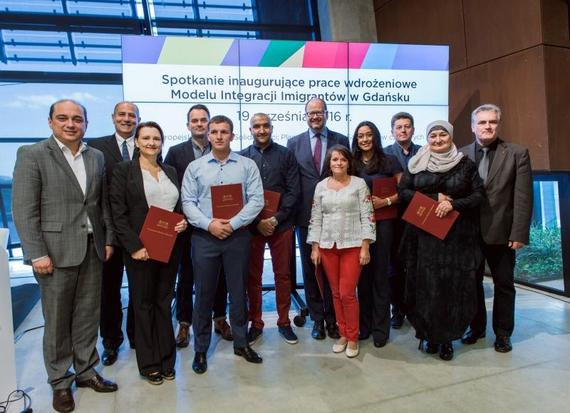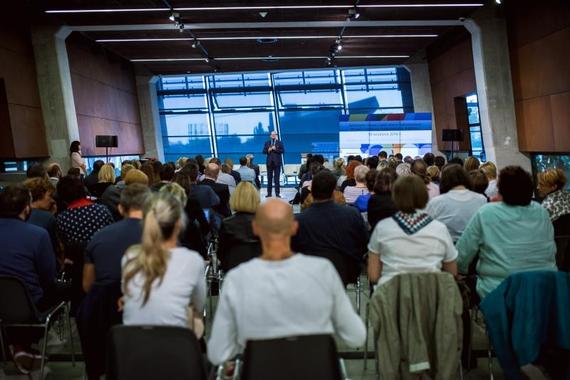In accord with my ongoing effort to reverse Gdansk's and Polish record of nationalism and to make our city more immigrant-friendly, the Council of Immigrants was created. It is a part of a wider immigration policy accepted by the City Council. Now I look forward to getting help and advice from 12 people from different parts of the world. As volunteers they will advise the mayor and the municipal administration on issues of integration of migrants.It is the first such body in the country. Immigrant Council will advise the entire city administration on ways to better integrate foreign newcomers in our city.
 Members of the Council of Immigrants. First from the left - Basil Kerski (Director of the European Solidarity Center), first from the right - Bogdan Oleszek (Chairman of the City Council in Gdansk). Photo: D. Paszlinski
Members of the Council of Immigrants. First from the left - Basil Kerski (Director of the European Solidarity Center), first from the right - Bogdan Oleszek (Chairman of the City Council in Gdansk). Photo: D. Paszlinski
Some prefer to pretend that there is no problemThe council consists of residents of Gdansk coming from Chechnya, Palestine, England, Germany, Tunisia, Ukraine, Colombia, Kazakhstan, Uzbekistan, Russia and Syria. Some of them have Polish roots, others do not. They differ among themselves in the level of education, skin colour, and religion. But I am convinced that as soon as this program starts working, other Polish cities will look at us as pioneers in integrating our residents.
There will be those who will keep their fingers crossed for our success, but there will be many who will rub their hands, if we stumble, as with any challenge. They would say: "why were you dealing with this? It would have been better to pretend there was no problem."
Hedi Alieva, a Chechen-born Muslim, a member of the Council, said that Polish people understood Chechens because we were all against communism. She is the former statistics clerk from Grozny, who has been in Gdansk for three and a half years.
I believe the key to the idea to make the city more immigrant friendly has been to get people talking. Our ally is the Migrants' Support Centre, where Alieva is a volunteer. The centre was set up four years ago to act as a bridge between migrants arriving in Gdansk and the municipal units.
There are 15 000 immigrants in Gdansk and nobody can pretend they do not exist. I am of an opinion we need to build relationship with them based on mutual trust.
830 000 Poles in the UK
I like to remind my compatriots that close to 830 000 Polish people have moved to Great Britain in the years following our accession to the EU. We are the most numerous minority on the islands. We have the right to demand that the British receive and treat us with respect.
At the same time we do not want the rules to apply in Poland. It is pure hypocrisy.
I often point out, that there is no such thing as a pure Pole, a pure Lithuanian or a pure German. These racist theories had long gone bankrupt, so do not let them reappear. You can scan all of us, and come out with a perfect mosaic of an "ethnic periodic table." That's how ethnically diversified we all are. And, it enriches the city.
I have written here about Gdansk as the first city in Poland with the clear policy on integration of immigrants. The first meeting of the Forum on Migration and Integration took place in September 2016 in the European Solidarity Centre. Its boss is Basil Kerski of Polish-German descent, whose father is Iraqi. The forum consists of 150 people from various municipal organizations and institutions that have been involved in writing the Immigrants Integration Plan. Now they will take care of its implementation.
History has shaped our city as naturally pluralistic. We have a special DNA. Before 1945, everyone here spoke German. Gdansk was then Danzig, a Protestant outpost. Then those people were moved and replaced by others. My family came from Lithuania.
 We shaped our immigrants policy together with many stakeholders. A lot of people participated actively. Photo: D. Paszlinski
We shaped our immigrants policy together with many stakeholders. A lot of people participated actively. Photo: D. Paszlinski
Gdansk is also used to upheaval and handles it well. Protest movements against a superimposed communism happened here in 1968, 1970 and 1976. In the spirit of freedom and liberty, Solidarity was born here in the 1980s because a group of special people - workers and intellectuals - met and trusted one another. And today we have a problem with trust.
It is important that influential people stand up for positive European values. Therefore, The city hall's department of social development organises regular networking sessions between the support centre, the immigrant community, the police and other stakeholders.
The reality in Poland is that immigrants are invisible, and so are all the more exposed to danger and abuse. It is our responsibility to build a safe environment for them. And the best place to do that is at the grassroots level - in the cities.
